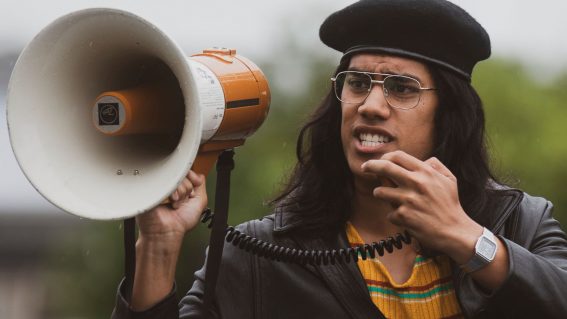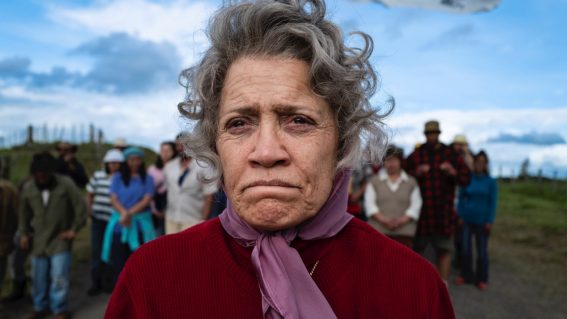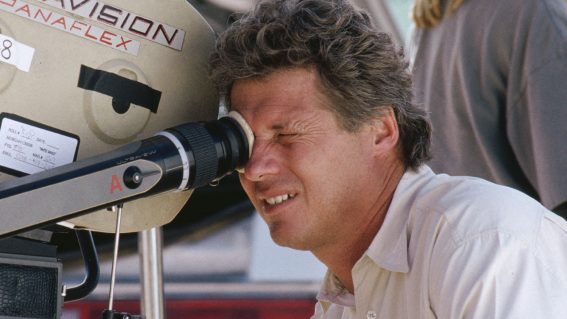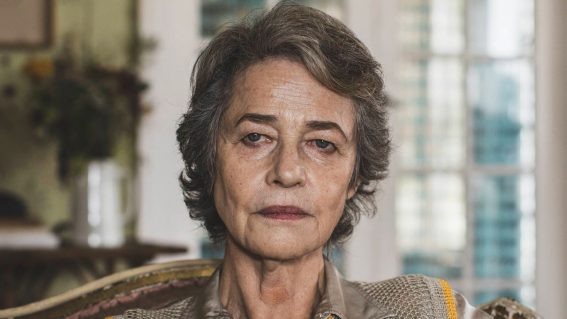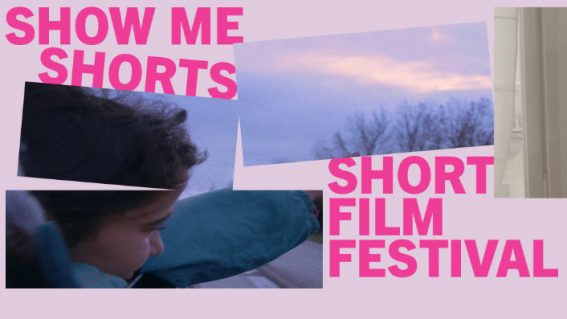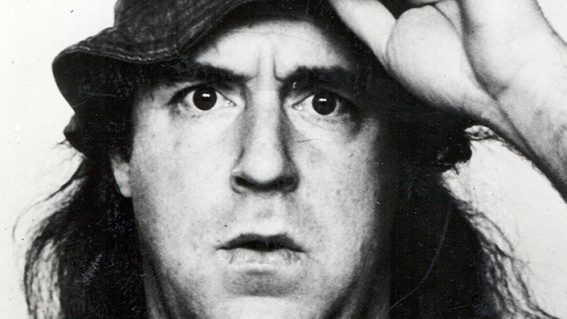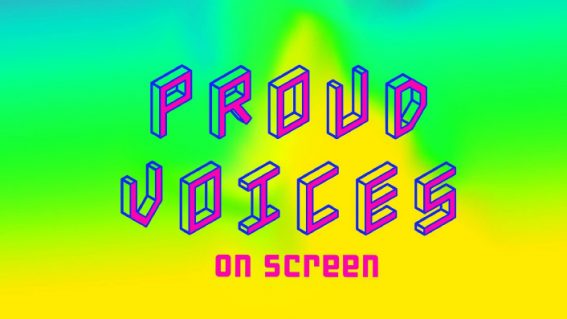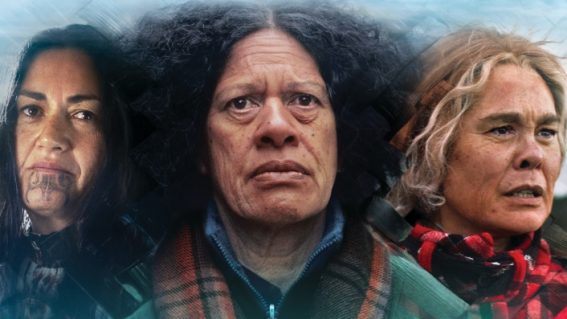Stars of The Legend of Baron To’a on their bold NZ action-comedy
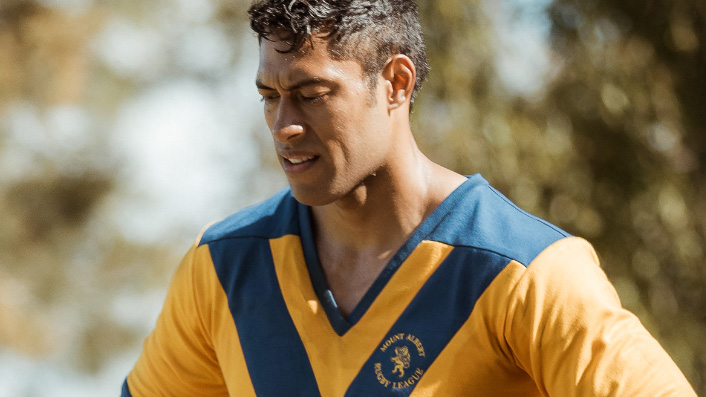
A new Kiwi film takes the fight from the wrestling rings of the 1980s to a suburban street in Aotearoa.
In cinemas from February 20, The Legend of Baron To’a is a proud example of the rarest of Kiwi film genres, the action-comedy. A suburban cul-de-sac is the setting for this tale of Fritz, a young Tongan man grappling with his wrestling superstar father Baron To’a’s legacy—both metaphorically and literally—following in his deceased father’s footsteps by fighting for the return of his dad’s stolen championship belt.
Stars Uli Latukefu (playing Fritz) and John Tui (Baron To’a) joined us for a chat about the film, its embrace of the action genre, uniqueness and cultural importance.
This interview has been edited for length and clarity.
FLICKS: The Legend of Baron To’a is a classic action-comedy. What films of that type did you compare it to when first reading the script?
ULI LATUKEFU: It was a hard one to figure out initially because the script was quite hyper-real, quite heightened. Kung Fu Hustle was kind of the sort of vibe that I’d gotten initially. But we really depended on the script and what director Kiel McNaughton had envisioned to kind of get that tone of it. And, if I’m completely honest, we were kind of feeling it out probably a lot, which was kind of nice. That’s a nice way to work, I think.
JOHN TUI: Yeah, not knowing the outcome. Unlike something like Shortland Street, you know what I mean? Because it was urban and it’s action, it was like Rumble in the Bronx for me—the first of its kind when Jackie Chan came over, and there was that collaboration between the Asian market and the American market and trying to get into the mainstream from there. The level of the action in the movie is very heightened, sort of like for an American market, but you will recognise the landmarks, as they were very Kiwi at the same time. I’ve never seen anything attempted that way from New Zealand, period.
FLICKS: I mean, it’s just awesome to see this genre set in a suburban cul-de-sac in Auckland. That’s great.
ULI LATUKEFU: Yeah, I’m surprised it hasn’t been done before. I mean, a genre film like this. I’m from Australia, so I don’t have that much of a knowledge of local Kiwi films, but I’m surprised as New Zealand has some of the best stunt crews, stuntmen and women, on the planet. Everyone says the stunties here are world-class. So, for me, it was just kind of like, “Like, why? Well, what’s the problem?” But I’m just lucky I’m in one of the good ones [laughs].
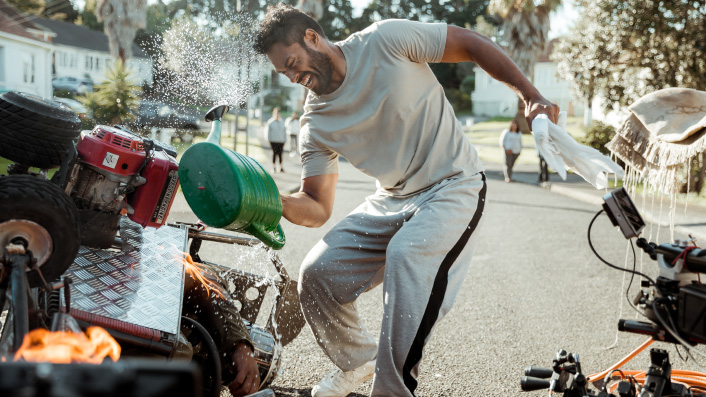
FLICKS: How did each of you prepare for what the film was going to have in store for you?
JOHN TUI: It was different for me. I was in flashbacks of the Baron, so a lot of my preparation and rehearsals were in the ring to get that 80s nostalgia and wrestler feel to it. They weren’t as animated as they are now, nowadays wrestlers have the whole performance, theatrics, and everything. For me, it was trying to get the time period right. I’m already hyperactive by nature, so I had to nullify that. I’d watch a lot of the early wrestlers, King Haku, the Samoans, some of the Islanders from the 80s and mimic them, and then I had to learn how to body slam and how to land right. A lot of my action was in the ring. And then in terms of the urban fight, I was very comfortable in that element of beating up drug dealers on the front lawn with an Afro and jandals. It was fantastic!
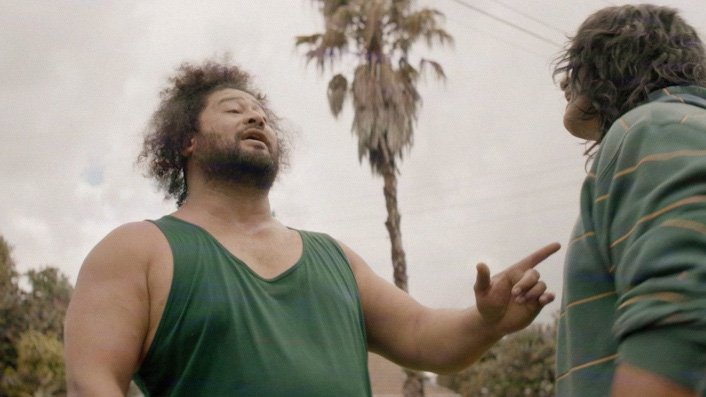
ULI LATUKEFU: I loved seeing everyone work and prepare because of the detail. It was something that I really appreciated, working with other actors who appreciated detail. It wasn’t just throwing this thing together. So with Fritz, I decided that as the son of a legendary wrestler, there was some awareness of his physicality and the skillset, but also being the kind of intellect that he is, wanting to kind of develop on that and grow in his skills. So we talked about anime and mixed martial arts, kickboxing, and a bit of boxing, and that’s kind of apparent in the movie, I think. But it was hard. We were working really, really hard every day, going through the sequences and that kind of thing. Dieting and that as well on top of that…
FLICKS: I think that last bit pays off in one of the many sequences where you’re objectified as a half-naked actor in this film.
ULI LATUKEFU: [Deadpan] Really? I didn’t even notice that.
JOHN TUI: I really enjoyed watching Uli bring the action to life and also his character needed it because it’s a lot of us. The expectations and the pressure of having a family name or a standing within the family and then to be in the shadow of such a reputation like his father, who lived the immigrant dream of coming to New Zealand and then becoming a wrestler and becoming an international superstar. And I could relate to this character. The action, for me, was the momentum of the movie as we followed him, as it’s really physical, and I’m exhausted watching him go through his journey, but also—the man could fight, man. There’s some really good action scenes in this movie.
FLICKS: I think the first time in the film where you see someone tap out of a submission hold, you understand that there’s something not quite real about this environment. I really like the idea that this whole micro-community had learned from—even when they’re fighting—been influenced by Baron To’a and his wrestling. There’s something really cool about that.
JOHN TUI: It’s the world that we’re in now. Back in the day, I remember it was K-1 for us. A lot of kickboxing as well as wrestling. And we used to imitate that on the trampoline, swimming pools, at a party. You just have to go on WorldStar and watch dudes wrestling and jumping on the top of tables. And so the wrestling element is all through this. Fritz, he’s not your average guy, right? He’s articulate in the way he holds himself, but being the son of Baron, everyone will watch him and go, “He gets that from his dad.”
ULI LATUKEFU: It’s cool too because I think that action really does inform the characters in this storyline. Fritz really tries to avoid repeating his father’s legacy, the way that he handled problems and stuff like that, but then by the end of it, you realise in this particular circumstance, he has to go there and unleash the beast and follow in his father’s footsteps. Really, the action is part of informing the whole story. It’s ingrained in it.
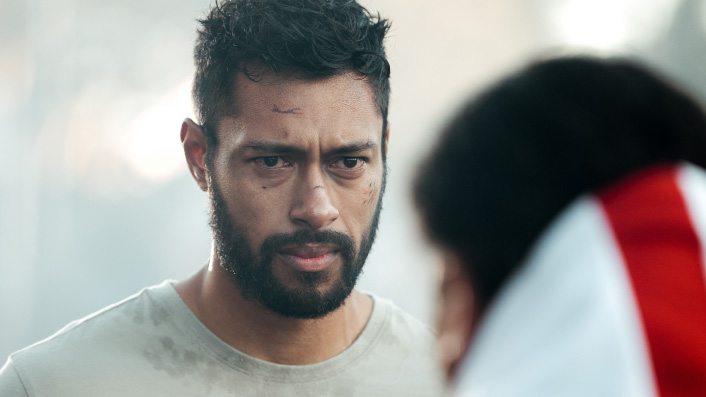
FLICKS: There’s also the unexpected. A touch more violence than you’d expect in a fight scene or a gag that leans in a bit further than you’d think. I think there’s a lot of surprises waiting for the audience when they come to see it.
JOHN TUI: They want to be surprised. I mean, you don’t go to the theatre to watch and predict everything that happens on screen. You want to be taken in, but it’s hard to surprise these audiences now. This generation is different, man. They want everything to be immediate. They want it now. And then they want to be surprised. The last 20 minutes, for me, is probably the most anticipated because you follow Fritz and you’re just rooting for him. And then he does things unconventionally like that scene where he’s holding the buckets. I mean, “What’s he going to do with them?” And then, “Oh my God, I never…”
The filmmakers and crew pushed the envelope on this. It’s not just the fighting. It’s the way they creatively show the violence and gave it its power and made it funny at the same time, and then made us go, “Wow, I never thought of doing that in a fight.” And the film does it convincingly. It’s got a talented cast. They pull it off. You can’t just say, “Right, going to do an action movie,” and then we’re going to like it. There has to be some sort of narrative that goes through him and has us rooting for him. So I really like the last 20 minutes because I’m just with him, like Rocky. As an audience, we’re going like, “Win. Just win for us, would you?”
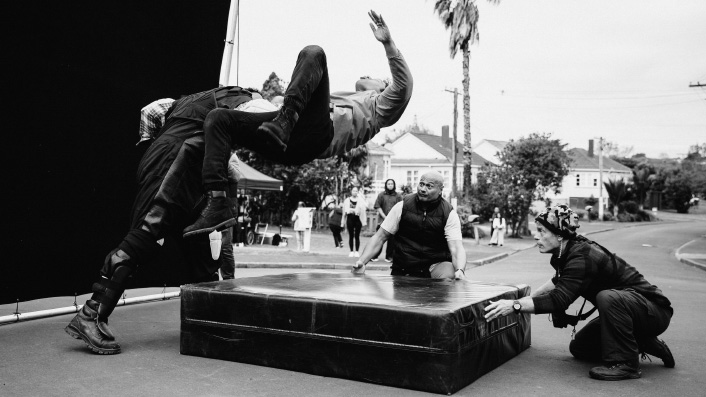
FLICKS: The fights are largely set in motion the theft of the Baron’s belt, and Fritz going out to get it back. Clearly, for everyone involved, it’s more than a belt, more than a trinket.
JOHN TUI: It doesn’t become just a belt anymore when you see what the father’s done and how he was revered. We all know that it’s more than just a belt. For him, getting the belt back, it’s a matter of respect for somebody in our community. It’s not to be taken the piss out of. Yeah, it’s that fight-the-bully mentality, man, no matter where you are. And I think the themes in this are universal. Like family legacy, the expectations on one, and on our children, pretty much. The way Fritz deals with it is that he’s articulate. He articulates everything. He’s very strategic. I love watching Fritz writing on the window and mind-mapping his attack in mathematical form, and I’m sitting there like, “Wow, this is a new approach.” That conversation you have when you’re breaking it down, and it shows you and your movement. It’s great, I reckon.
ULI LATUKEFU: Sorry, I’m just looking for my wallet to give you more money for all these compliments [laughs]. I don’t know if you’ve found it here somewhere…
FLICKS: What are your hopes for how New Zealanders will relate to this film?
JOHN TUI: We were at an interview yesterday, and they said that the beginning set the tone when the two actors are speaking in Tongan. And you already know how Tongans support, man. We’re crazy. We support hard. We show up. And so when we’re speaking in our cultural tongues, one of the women at Tagata Pasifika said they’ve never seen that before. That’s what I mean. Not only is this movie unpredictable, we’re going down a track that has never been done before. It’s avant-garde for me. It’s new territory and I’m excited about it. I think New Zealand will, in the beginning, know that this has never been done before. The action is Marvel quality, and it’s very Kiwiana in terms of that domestic feel. We can relate to that.
And there’s something about life in a cul de sac that’s just kind of like suffocating and, at the same time, you’re forced to have to deal with it. You’re forced to have to face these things. There’s no way out. So the strength in itself taught you a lesson, like you can’t get out of here, and then the only way to get out of here is to actually face all of these issues. And that last 20 minutes, man, you’re just going up this ladder and taking the audience with you.
ULI LATUKEFU: I think, for me, it’s similar. I mean, I don’t really like to kind of predict how audiences will interpret a film or take away, but I hope that people will see themselves in the movie—that’s the kind of idea for me. People of our background, but also a broader perspective, that they see themselves reflected in that way.
JOHN TUI: We couldn’t follow anything up because there wasn’t a blueprint for us there, like, “This movie’s going to be like this,” but we all came and we read the script and went, “Let’s just go.” And I think an artistic choice is to just commit completely to it. You can’t judge it. The moment you sit down and judge it or you’re over-thinking, you’re done. I had my father on-set, and the way I saw Baron To’a, for me, was just like every uncle, every dad. It was fresh, but I didn’t want him to just be fresh and funny because I’m sick of that humour. It’s just overplayed for me, so this is something new for me.
ULI LATUKEFU: John Argall, the writer, has done a really great job. I think it’s a new voice in a lot of ways because his experience is really unique. A lot of it is written into Fritz’ character, into Fritz, and it’s refreshing. And it takes on the conversation about identity, culturally speaking, and all that kind of stuff.
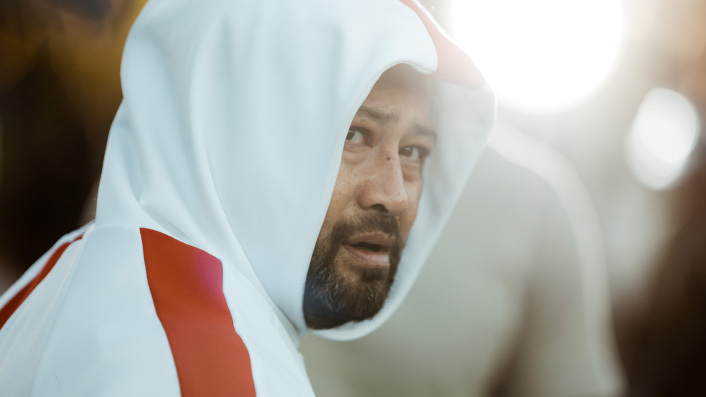
FLICKS: You’ve really brought a superhero to life with your character. To bring To’a to life the way you have. Do you think we’re going to get to see more of that guy again? I’d like to.
JOHN TUI: You know what? You talk to your people, tell them to start blogging [laughs]; let’s get this momentum going, and then we’ll see. But, for me, the way I saw it was I had to instill him in every second and make this man great so that we could feel the weight on his shoulders. “You’re his son.” I mean, the poster, for me, was awesome because the silhouette of me, my character, and then you [Uli] and your hero stance.
ULI LATUKEFU: I remember when we were deciding on the title of the film. And The Legend of Baron To’a came up, and I pushed for it. I explained it in a way that his legacy is his kind of mantle. It doesn’t just end with him. It’s a transferable kind of idea, and so we needed to kind of give him gravitas. We needed to first explain who Baron To’a was, but also give him this kind of presence. I’m glad you said that because that’s the idea, is to give him that kind of presence.


